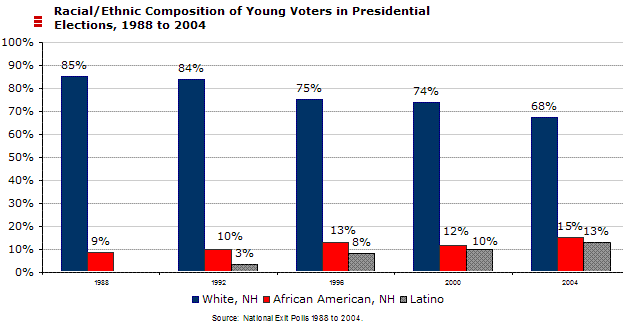I spend time inside three schools–a Washington prep school that our older daughter attends, our younger daughter’s D.C. public school (which draws from families of very diverse race and income), and a Hyattsville high school where I do some civic work. These are three worlds. People in each building have different expectations, they talk differently, they evaluate one another according to different criteria, they have different experiences. And everything in each school is of a piece. The clothes, the architecture, the explicit rules, the curriculum, the vocabulary, even the food–all match. Although life will bring a few surprises, it’s powerfully obvious that the kids at the prep school are getting ready to run America, the ones in Hyattsville will mostly stock shelves and answer phones, and the students in the diverse school will have diverse paths–largely forecast by their parents’ current situations.
Today’s New York Times launches a series on social class. There are some zippy graphics on this page. You can see, for example, that inequality is growing and that 75% of families that were in the bottom income quintile in 1988 are still in that quintile today. Of those currently in the top fifth, more than half were already there in 1988. These statistics don’t surprise me; in fact, I would have guessed that fewer families had ascended economically in the last 17 years.
What replicates social inequality in America: families’ financial assets, their culture, their social networks? Students at a fancy downtown Washington prep school have more knowledge and better cognitive skills than those at a standard comprehensive public school. Cognitive skills may result from nature or nurture, but in either case they are economically valuable. Since a prep school is selective, it can pick applicants who have the skills to prosper later in life. However, cognitive skills are not everything. We see a great deal of inherited inequality in the US despite differences in measured skills. Christopher Jencks notes (pdf, p. 52): “If one compares American workers with the same test scores and the same amount of schooling, the Americans’ wages vary more than the wages of all Swedish, Dutch, and German workers.”
Many Americans believe that there is less equality in the United States than in other developed countries because there is more competition here; and competition generates wealth. However, within the wealthy countries, there is no correlation between efficiency (wealth produced per hour or per person) and inequality (Jenck’s pdf, p. 53). There is more inequality in the United States than in most Western European countries because our top tax rates are lower and the basket of services for poor people is smaller. The poorest Americans have much less real, after-tax purchasing power than their counterparts in Western Europe.
Why should we care? I don’t believe that it’s any of my business if other people are richer than I–not even if they are much richer. That’s because at my income level, I already enjoy the security and the range of choices that our society is capable of providing. But there are many millions of Americans who can’t afford education or travel, nor can they choose what work to do or where to live. They receive lousy health care. There are also billions of human beings whose poverty sharply shortens their lives and limits their freedom. It is not because equality is good in itself, but because poverty limits freedom and welfare, that we should care about inequality.
